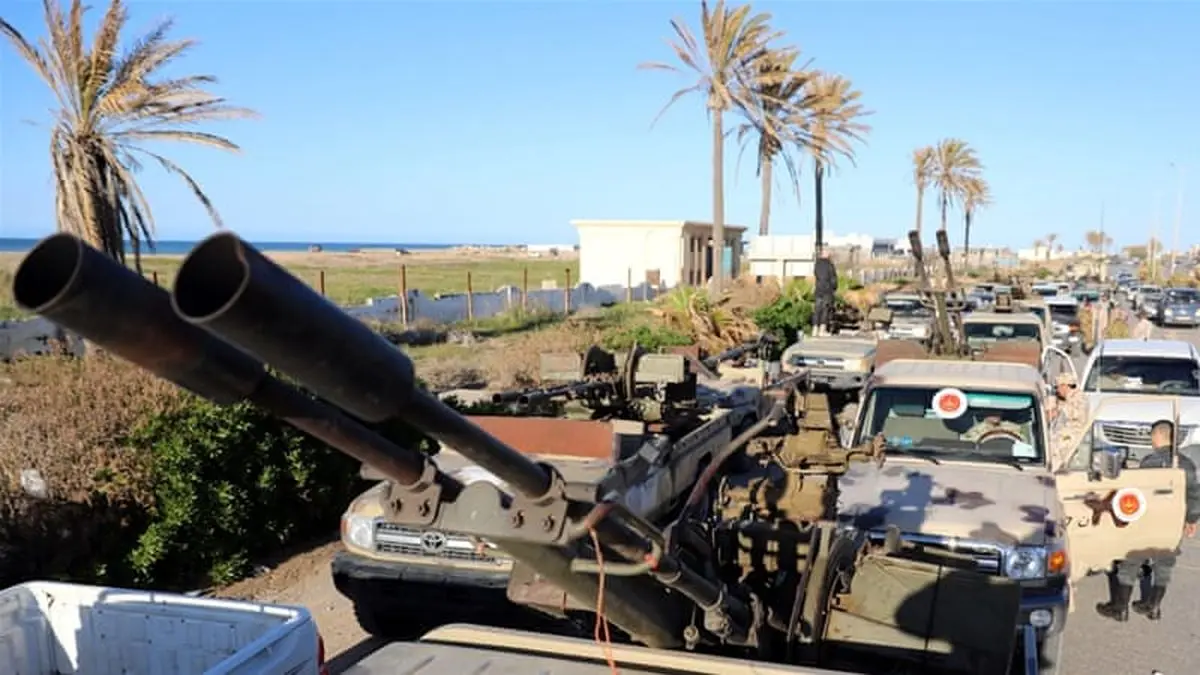As Haftar meets Sisi, GNA forces shoot down LNA fighter jet

Troops loyal to Libya's internationally recognised government have shot down a fighter jet belonging to the eastern forces under the command of General Khalifa Haftar, on the same day the renegade military leader held talks with Egypt's president in Cairo.
Military sources within the United Nations-backed Government of National Accord (GNA) said the jet operated by the self-styled Libyan National Army (LNA) was downed on Sunday in Tripoli's southern outskirts, as fighting for control of the capital rages.
Al Jazeera's Mahmoud Abdelwahed, reporting from Tripoli, said LNA sources confirmed one of the LNA's fighter jets was shot down but added the pilot had "escaped" after using a parachute to eject from the unit.
Pro-government forces said they were "searching for the pilot", he added.
No other details were immediately available.
The downing of the LNA jet came after Haftar's forces stepped up air raids against pro-GNA troops in recent days as part of a campaign launched on April 4 to wrestle control of the capital.
"Haftar's warplanes have been targeting several locations in and around Tripoli and also warplanes with the GNA have been targeting Haftar's locations south of Tripoli," Abdelwahed said.
Libya, which has been mired in chaos since the NATO-backed toppling of longtime ruler Muammar Gaddafi in 2011, has been split into rival eastern and western administrations since 2014.
In March 2016, GNA chief Fayez al-Sarraj arrived in Tripoli to set up a new government, but the Haftar-allied administration in the eastern city of Tobruk refused to recognise its authority.
However, Haftar's push on the capital threatens to further destabilise the oil-rich country and reignite a full-blown civil war.
At least 121 people have been killed and 561 wounded since the LNA started its offensive on April 4, according to the World Health Organization (WHO).
Both sides accuse each other of targeting civilians.
About 15,700 people have been forced to flee their homes because of the conflict, according to the UN Office for the Coordination of Humanitarian Affairs (UNOCHA), with a "significant number" of others still stuck in conflict zones.
The situation remained "very tense" on Tripoli's southern outskirts, Abdelwahed said, with the mass displacement constituting a "crisis" for authorities attempting to rehouse those forced to flee.
Sisi-Haftar meeting in Cairo
The eruption of conflict has forced the UN to abandon its plans for a conference aimed at brokering an agreement to hold elections as part of a solution to the long-running crisis.
The meeting was scheduled to bring Haftar and al-Serraj together in the southwestern town of Ghadames from April 14 to 16.
Instead, Haftar met on Sunday with Egyptian President Abdel Fattah el-Sisi in Cairo.
A statement from Sisi's office following the pair's meeting did not mention Haftar's offensive directly but "confirmed Egypt's support for efforts to combat terrorism and extremist groups and militias in order to achieve security and stability for the Libyan citizen".
Haftar, who casts himself as a foe of "extremism" but is viewed by opponents as a new authoritarian leader in the mould of Gaddafi, has vowed to continue his offensive until Libya is "cleansed" of "terrorism".
Egypt has close ties with the LNA leader but also publicly supports the UN-led peace efforts in Libya.
Coinciding with the Sisi-Haftar meeting, the UN's envoy to Libya said on Sunday that the body's position on ending the country's turmoil would "not change".
"You've learned and tasted war. No matter how obstinate one becomes, there is no solution except a political one," Ghassan Salame, a Paris-based Lebanese academic, said in a Twitter post.
END
